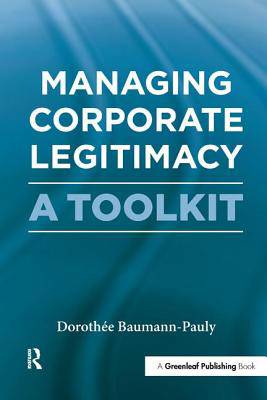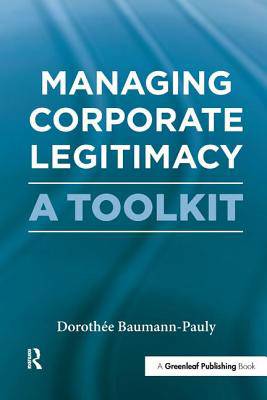
- Retrait gratuit dans votre magasin Club
- 7.000.000 titres dans notre catalogue
- Payer en toute sécurité
- Toujours un magasin près de chez vous
- Retrait gratuit dans votre magasin Club
- 7.000.0000 titres dans notre catalogue
- Payer en toute sécurité
- Toujours un magasin près de chez vous
Description
The failure of many governments to provide basic rights for their citizens has given rise to the expectation that globally operating corporations should step in and fill governance gaps, for example in the area of human rights. Today, many large multinational corporations claim to conduct business in a socially responsible manner, yet no tools exist to assess whether and to what degree they have indeed systematically revised their business practices to take on these new responsibilities. Managing Corporate Legitimacy addresses these research gaps by clarifying the role of the corporation as a private actor in global governance at conceptual and empirical levels; by contributing to our theoretical understanding of CC as a new phenomenon in globalization; and by furthering the development of appropriate approaches to CC in practice through its toolkit.
The tool structures the implementation process in five learning stages (defensive, compliance, managerial, strategic and civil). The final civil stage describes political corporate behaviour. The author includes an empirical assessment of five Swiss multinationals in this book which reveals that most companies - even those with relatively long-standing and mature policies on social and environmental issues - have only just started to learn how to become corporate citizens. The book therefore concludes with a discussion of an issue-specific extension of the assessment tool and presents methods for setting priorities in the approach to corporate citizenship that may also facilitate corporate engagement with stakeholders.
The tools developed in this book provide practical and detailed guidance for implementing and embedding CC and managing corporate legitimacy. It will be essential reading for practitioners looking for ways to legitimize their engagement with societal issues and for academics considering how we can better measure the engagement of business with CC.
Spécifications
Parties prenantes
- Auteur(s) :
- Editeur:
Contenu
- Nombre de pages :
- 252
- Langue:
- Anglais
Caractéristiques
- EAN:
- 9781906093945
- Date de parution :
- 25-09-13
- Format:
- Livre relié
- Format numérique:
- Genaaid
- Dimensions :
- 157 mm x 236 mm
- Poids :
- 498 g

Les avis
Nous publions uniquement les avis qui respectent les conditions requises. Consultez nos conditions pour les avis.






